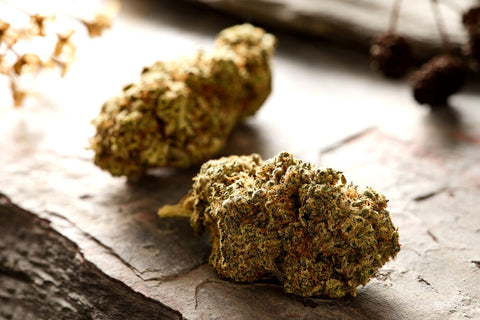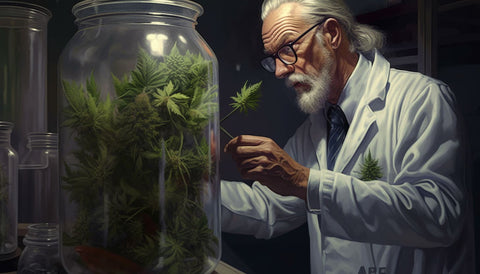Many people are turning to CBD to help them quit smoking cannabis. CBD is a non-psychoactive component of the cannabis plant, which can often be used as a replacement for THC. But unlike THC, it offers the same health benefits without you or your body being "high" or "stoned."
How People Use CBD to Quit THC
CBD oil can help you reduce anxiety, improve sleep, and balance your mood. It also provides anti-inflammatory benefits that ease the process of quitting THC for those with chronic pain. Additionally, it helps to modulate dopamine levels which can reduce cravings.
By using CBD in place of THC, you can reduce your body's dependence on marijuana. This can ultimately avoid potential withdrawal symptoms associated with quitting THC.
How CBD Helps with Marijuana Withdrawal Symptoms, From a Scientific Perspective
CBD binds to ECS receptors, which affects our uptake and response to neurotransmitters. This process can produce various effects, including pain relief and anxiety reduction. In this way, CBD can help balance out the negative effects associated with using THC in the central nervous system. It’s why CBD can aid against cannabis withdrawal syndrome or other issues when quitting cannabis.
It's worth noting that CBD can do more than treat problematic cannabis use disorders. It increases the release of gamma-aminobutyric acid (GABA), an inhibitory neurotransmitter. GABA may reduce anxiety from withdrawal symptoms.
CBD regulates the activity of prostaglandins — the so-called "pain hormone" — and inflammatory cytokines. It aids against withdrawal in individuals consuming marijuana for chronic pain conditions. CBD can also help increase serotonin levels which may improve mood and reduce cravings for THC.
Through its interactions with the ECS, CBD can do more than help you quit smoking cannabis. Experts show it can help people cope naturally with withdrawal symptoms from a range of addictive substance abuse issues.
Is THC Addictive?
Like other cannabinoids, THC binds to ECS receptors in the brain. It triggers the release of dopamine, the neurotransmitter associated with pleasure and reward.
Over time, this response can lead to changes in brain chemistry. Users may find it difficult to feel pleasure or satisfaction without using THC.
While its addictiveness is still in question, THC can cause drug-seeking behaviour and reliance on THC for feelings of well-being. This kind of dependency on any psychoactive substance can be detrimental to one's physical and mental health.
What is marijuana dependency?
Marijuana dependency describes the development of physical or psychological dependence habit on cannabis. It occurs with a steady increase in consumption, leading to THC tolerance and increased cravings.
Withdrawal can begin to occur when a dependent stops using marijuana. Symptoms of withdrawal range from headaches to irritability and anxiety or even insomnia. In extreme cases, dependency can manifest behaviours resembling those associated with addiction.
If you have a marijuana dependency you may experience difficulty sleeping, mood swings, changes in appetite, and withdrawal symptoms when you attempt to quit using marijuana. Their use becomes compulsive and hard to control despite the risk of negative consequences. Some dependents may engage in risky behaviour, such as driving while under the influence of THC.
What Does THC Addiction or Dependency Look Like?
A typical case of marijuana addiction or dependence involves significant tolerance to THC. This means the person needs to smoke more to experience the same effects as before. The individual may also display changes in behaviour and a decreased interest in activities they once enjoyed.
Other signs include an inability to control or limit marijuana use. Dependents may find themselves spending excessive amounts of money on marijuana. They may even neglect important tasks and relationships in favour of marijuana use.
If you suspect you might be addicted to marijuana, here are some common signs that you should watch out for:
- Frequently smoking more marijuana than intended.
- Losing track of time when doing so, to the extent of seriously harming productivity.
- Constantly needing to use marijuana or suppress cravings with snacks and other substitutes. Binge eating can be a coping mechanism, especially when used to distract from a void.
- Finding it difficult to stop using marijuana despite wanting to do so.
- Struggling with daily tasks because of marijuana use. THC is considered a controlled substance, and can impair motor function in high doses.
- Excessive spending on marijuana, marijuana-derived products and paraphernalia.
- Exhibiting aggravated behaviour when not using marijuana, such as irritability and lashing out.
What are the Symptoms of THC withdrawal?
THC withdrawal symptoms are usually minimal and subside within a few days. Some people, however, may experience more severe symptoms like anxiety, sleeplessness, and mood fluctuations.
THC withdrawal symptoms may include:
- Anxiety
- Insomnia Cravings
- Depression
- Irritability, agitation, and sweating
It should be noted that not everyone who consumes THC will experience withdrawal symptoms. The severity of the symptoms also differs between individuals. If you are concerned about withdrawal symptoms, you should consult with your doctor.
Which CBD is best to stop Smoking?
There are numerous CBD brands on the market, making it tough to determine which one is best for you. However, we recommend that you use HempHash's products. HempHash is a UK-based business that gets its CBD from organic European cannabis. Their products are all third-party evaluated for purity and efficacy, and they provide a wide range of options, including oil, capsules, gummies, and topicals.
Three Ways CBD Can Be Used to Help You Quit THC
It's worth noting that CBD (THC's non-intoxicating relative) is not just available as a tincture to take sublingually. It can also be found in dispensaries in the form of oils, capsules, edibles, hash, topicals, or even e-liquids for vaping. Each type of product is designed to release the beneficial effects of CBD into the body at different speeds.
A study by the University of California San Diego found that CBD can help reduce withdrawal symptoms in people who are trying to quit THC. The study participants who took CBD reported feeling less anxious, depressed, and irritable, and they had fewer cravings for THC.
One way to use CBD to help you quit THC is to take it cold turkey. This means that you stop using THC altogether, and you don't gradually reduce your intake. CBD can help to reduce the withdrawal symptoms that you experience when you stop using THC, making it easier to stick with your quit plan.
Another way to use CBD to help you quit THC is to take it in conjunction with tapering. This means that you gradually reduce your intake of THC over a period of time. CBD can help to make the tapering process more comfortable, and it can also help to reduce the risk of relapse.
Let's look at three ways you can use CBD products to help you quit smoking weed or craving THC.
Does CBD cancel out THC?
Combining THC with CBD is a popular method of quitting. Individuals can limit their cravings by taking small doses of both compounds. They can do this while avoiding the high associated with high THC consumption. Users can then slowly wean off THC while maximising CBD's therapeutic benefits at the same time. However, HempHash does not recommend using THC at all.
Cannabidiol (CBD) does not completely negate the effects of tetrahydrocannabinol (THC), but researchers have studied its ability to reduce the intensity of THC's psychoactive effects. CBD can increase anandamide levels and block CB1 receptors in the brain. It is advisable to start with a low dosage and consult a healthcare professional before using cannabidiol.
Is CBD less effective without THC?
CBD can be effective without THC, but it may be less effective. THC and CBD work together in what is known as the entourage effect, meaning that the two compounds work better together than they do separately.
THC is the compound that produces the "high" associated with cannabis use, but it also has other effects, such as pain relief and appetite stimulation. CBD does not produce a "high," but it has a number of other effects, such as anxiety relief and anti-inflammatory properties.
When THC and CBD are taken together, they can work synergistically to produce a stronger effect than either compound would have on its own. This is why some people find that CBD products that contain THC are more effective than CBD products that do not contain THC.
However, it is important to note that not everyone experiences the entourage effect in the same way. Some people may find that CBD is just as effective without THC, while others may find that they need THC to get the full benefits of CBD.
If you are considering using CBD, it is important to experiment with different products to see what works best for you. You may also want to talk to your doctor to see if CBD is right for you.
Taking Pure CBD
Another option involves taking pure CBD instead of consuming any THC whatsoever. Because it's non-psychoactive, CBD can help against pain or inflammation without causing any mental impairment at all.
People who've tried this method report feeling more relaxed and in control. This allows them to gradually transition away from using marijuana products entirely.
Our products all contain less than 0.2% THC, as required by UK law. That includes our full spectrum CBD oils, CBD hemp flower, and CBD hash.
Substituting CBD for THC
CBD topicals are a great option for people who are looking for localized pain relief without the psychoactive effects of THC. Researchers have found that CBD topicals can be an effective treatment for a variety of conditions, including chronic pain, arthritis, muscle pain, and skin conditions such as eczema and psoriasis.
**A study by researchers at the University of Colorado Boulder found that CBD topicals can reduce inflammation and pain in the skin. These treatments work by interacting with the cannabinoid receptors in the skin. These receptors are part of the body's endocannabinoid system, which is involved in regulating pain, inflammation, and other functions. When CBD binds to these receptors, it can help to reduce inflammation, relieve pain, and improve skin health.
**CBD topicals are generally well-tolerated and have few side effects. However, it is important to start with a small amount and gradually increase the dosage until you find what works best for you. It is also important to talk to your doctor before using CBD topicals, especially if you are taking any other medications.
**Here are some additional benefits of using CBD topicals as potential treatments for pain:
- They are non-psychoactive, so you will not get high.
- They are localised, so they only provide potential pain relief to the area where they are applied.
- They are typically easy to use and apply.
- They are available in a variety of forms, including lotions, balms, and patches.
If you are looking for a natural way to relieve pain, CBD topicals may be a good option for you. Talk to your doctor to see if CBD topicals are right for you.
How Hemp Flower Can Ease Marijuana Withdrawal
One way CBD can be used to help quit cannabis is to incorporate CBD flower into your daily routine. Because of its high CBD content, hemp flower can reduce withdrawal symptoms associated with marijuana dependence. These include anxiety, irritability, and mood swings.
CBD Hemp flower can help to curb THC cravings and make it easier to stay away from cannabis in the long run. However, speaking with a healthcare professional before incorporating CBD products into your daily routine is essential.
Written by Eric Van Buskirk
Edited by Sepi Tambuza



